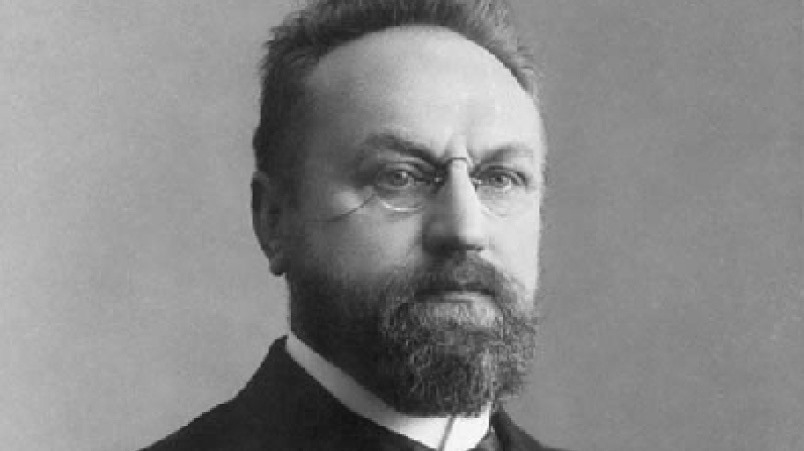
Bristley’s Guide to the Writings of Herman Bavinck offers among other things an overview of Bavinck’s life and work, a Bavinck bibliography, and an overview of secondary literature, both in English and in Dutch. Bristley has updated J. Veenhof’s older bibliography of Bavinck’s works (published in Bremmer, Herman Bavinck als dogmaticus, 425–46; additions in Bremmer, Herman Bavinck en zijn tijdgenoten, 299–301) by listing recent editions and translations and by adding a few items missing from Veenhof’s work such as the articles “Death” and “The Fall” that Bavinck wrote for the 1915-edition of the International Standard Bible Encyclopedia. Despite all its qualities, Bristley’s guide still contains some omissions and mistakes.
The following are a few items that are missing both from Veenhof’s and from Bristley’s bibliography:
- Bavinck, “Nader bescheid,” which is a reaction to De Wachter, “Dr. H. Bavinck over Amerika” (see section 2.10). During one of my visits to Heritage Hall in the Hekman Library of Calvin College and Calvin Theological Seminary in Grand Rapids, MI in 2004, a staff member gave me copies of these articles.
- Bavinck, “Geloof en liefde.” Bavinck mentions this article in his own (incomplete) bibliography “Lijst mijner geschriften.”
- Bavinck, “Dr. Bavinck over de zending,” a short speech about mission, delivered by Bavinck at the annual meeting of the Free University.
- Bavinck, untitled contribution, in Gods groote daden aan Israël. In this short contribution Bavinck agrees with mission among Jews and states his hope: “Zij zijn en blijven beminden om der vaderen wil. Als de volheid der Heidenen zal ingegaan zijn, zal gansch Israël zalig worden, en hunne aanneming zal dan het leven uit de dooden, de vernieuwing van hemel en aarde zijn.” (They are and remain beloved for the sake of the fathers. When the fullness of the Gentiles will have come in, all Israel will be saved, and their acceptance will be life from the dead, the renewal of heaven and earth.)
In his “Lijst mijner geschriften” (unpublished) Bavinck also lists some items for which I have not (yet) done further research: “Eene nieuwe Dogmatiek (Shedd’s Dogm. Theol. 1888) in de Bazuin 1888 of 1889?,” “Een missionair predikant, Kamper Kerkbode 3 Dec. 98,” “Hoofdartikel in Prov. OV. & Kamper C. (over benoeming van Meerkerk tot avondschoolopz) 10 Dec. ’98,” “Rede over Comenius, op de verg. v. Chr. Onderw Hilversum 22 Mei 1907.”
A few more comments on Bristley’s guide: probably due to a technical problem, the descriptions of the Hungarian translations on page 116 lack almost all accented letters; for the correct spelling, see Bremmer, Herman Bavinck als dogmaticus, 445. Bristley records that Our Reasonable Faith—the English version of Bavinck’s popular one volume dogmatics Magnali Dei—has been translated into Chinese and Korean. Actually, an Arabic translation in four volumes is also available and can now be found on the internet: بين العقل والإيمان bayna al-ʿaql wa-al-īmān [Between mind and faith]. Bristley gives only one English translation of De offerande des lofs, viz. The Sacrifice of Praise, trans. John Dolfin, but a second one is available on the internet: The Sacrifice of Praise, trans. Gilbert Zekveld. He leaves unmentioned that a searchable version (in revised spelling) of the second edition of the Gereformeerde dogmatiek is available in Online Bijbel DeLuxe: Studie-editie 2002 or its successor the Online Bijbel Studie DVD (various editions).
On page 128 Bristley describes Een Leidse vriendschap as “a biographical study [that] explores the correspondence” between Bavinck and Snouck Hurgronje, but it is rather an annotated edition of the correspondence itself (on page 139 n91 he seems to confuse Snouck Hurgronje, Amicissime with Een Leidse vriendschap). To his overview of Bavinck’s letters on page 139 can be added: Bavinck to Henricus Beuker, July 1, 1884, in Beuker, Abgeschiedenes Streben nach Einheit, 385–87.
In his section “Bavinck Scholarship in Dutch” on pages 144–45 Bristley has not attempted to list Dutch articles on Bavinck. Actually some tens of Dutch (scholarly) articles and essays on various aspects of Bavinck’s life and work exist, but it is also beyond the scope of the present study to attempt to give a full list. At present, the best starting point for finding literature about Bavinck and his context in Dutch is probably the extensive bibliography in Van Keulen, Bijbel en dogmatiek, 684–719.
For English translations of Bavinck and literature about him since the publication of Bristley’s guide, see John Bolt, “Bavinck Bibliography 2008–2009,” The Bavinck Review 1 (2010): 89–92 and John Bolt and Laurence R. O’Donnell, “Bavinck Bibliography 2010,” The Bavinck Review 2 (2011): 174–77. One important addition can be made to these bibliographies: Bavinck, Gereformeerde katholiciteit 1888–1918, ed. Van der Kooi (2008), which offers a new Dutch edition of some of Bavinck’s most important writings: De katholiciteit van Christendom en kerk, De zekerheid van het geloof, Modernisme en orthodoxie, Het problem van de oorlog, De navolging van Christus in het moderne leven and the chapter on the divine counsel from the Gereformeerde dogmatiek. For the most recent developments in Bavinck studies, see the website of The Bavinck Institute at Calvin Theological Seminary.
These additions and comments notwithstanding, Bristley’s guide is a very helpful tool for finding one’s way to Bavinck’s writings.
Note

This post has been adapted from the appendix of Willem J. de Wit, On the Way to the Living God: A Cathartic Reading of Herman Bavinck and an Invitation to Overcome the Plausibility Crisis of Christianity (Amsterdam: VU University Press, 2011). Full bibliographic information of the publications mentioned in this post can be found in the bibliography of that book.